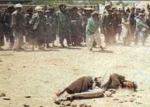13 February 2008
Stoning Women Pays
 If the practice of stoning (lapidation) exists across the Islamic world—most visibly in Afghanistan, Iran, Nigeria, Sudan, and the United Arab Emirates—it speaks much to Western forbearance that this same penalty, though reviled, can make the
If the practice of stoning (lapidation) exists across the Islamic world—most visibly in Afghanistan, Iran, Nigeria, Sudan, and the United Arab Emirates—it speaks much to Western forbearance that this same penalty, though reviled, can make theof one who commends the practice. Consider the case of Hani Ramadan and the state of Geneva.
Hani Ramadan—director of the Islamic Center of Geneva (CIG), grandson to Muslim Brotherhood founder Hassan al-Banna, and brother to Islamist superstar Tariq Ramadan—was dismissed from a public teaching post in suburban Geneva in 2003 for publishing a defense of stoning in France’s Le Monde. (Brother Tariq, who sought to distance himself from his brother on this point, lamely proposed a “moratorium” on the practice.)
This was not his first brush with the teaching establishment and the civil authorities: Ramadan’s colleagues blasted him for tasteless remarks on the place of women in 1996 and 1998; and Hani and brother both were refused passage to France for alleged ties to terror groups (in 1997 and 1996, respectively; Hani was also denied an Egyptian visa in 1999).
But the most recent affaire Ramadan began in the Fall of 2002, when the teacher drafted an opinion editorial on stoning, punitive amputation, and AIDS for the September Bulletin (posted to and since removed from the Islamic Center’s website) of the Committee for Respect of Muslim Rights (CRDM).
In it the author (1) claims “the punishment fits the crime: the severed hand for theft, stoning for illicit pleasure. This represents not only retribution, but a form of purification” and deterrence; (2) he demonstrates an odd compassion, writing: “While it’s true that stoning is a difficult spectacle […], reports reveal that the condemned is not long to suffer: the hail of stones dispatches the individual in the space of several seconds”; (3) and finally, he admits that while AIDS is certainly spread through transfusions of contaminated blood, “only those guilty of deviant comportment expose themselves to contagion.”
Also curious were his assertions that “the penalties that govern theft and adultery may only find application in a society respectful of Islamic practice and principle.” For example, he writes: “It is forbidden to remove the thief’s hand in a state that does not deliver […] the means to lead a dignified existence.”
An abridged version of the same document appeared shortly thereafter in France’s Le Monde (edition dated September 10, 2002), under the title La charia incomprise, or “Misinterpreting Shari’a.”
The saga continues as follows:
- October 11, 2002: Geneva’s Department of Public Instruction (DIP) suspends Ramadan. The following day, in a reply to researcher Albert Levy (which Le Monde refused to publish) Ramadan asserts that real democracy “will never thrive under Islamic skies.”
- February 5, 2003: Ramadan is terminated for reason that his role as Islamic Center chief and statements are “incompatible” and “clearly at odds” with the mission of public education.
- March 15, 2004: An administrative tribunal orders the state to return Ramadan to his post. The state refuses, but offers Ramadan any number of jobs away from children, which Ramadan refuses.
- April 4, 2004: Ramadan again commends stoning, in Geneva’s Matin Dimanche: “I’ll say it again, that [stoning] concerns not only females, but adulterous males, as well; this should refute the feminist case against me.” A new investigation is launched April 8.
- May 2005: The courts again demand the State to return Ramadan to his post. Geneva ignores the request, but agrees to disburse his regular salary ($9,700 per month in today’s dollars) to cover the period of his inactivity, and throughout the foreseeable future.
- January 16, 2008: Ramadan agrees to abandon his wish for reappointment, in exchange for two years’ salary, or about $230,000.
Geneva admits it made the largest allowable payout, for reason that the state was eager to close the case on “Mr. Stoning.” And to sweeten the pot, Geneva further agreed to reimburse his legal costs, of $80,000. Add to this five years’ wages, of $633,000, and one describes a settlement of some $1 million. News of Ramadan’s reward caused Geneva’s Matin to gush: “it pays to praise stoning.”
Such are the spoils of “lawfare” (legal wrangling designed to punish opinion). And such are the goals of lawful (or non-violent) radical Islam: to hinder efforts to query the faith, and establish a regime wherein nothing “Islamic” is subject to censure.
The city of Geneva offers guests the spectacle of the Reformation Wall, constructed a century ago. Here one reads the phrase that sings Geneva, the Reformation, and the confidence of the age: Post Tenebras Lux, “After Darkness, Light.” It may well be that Ramadan’s guiding phrase, as published in a clarifying remark, instead reads: “Human Rights are relative to culture.” A phrase that speaks both the diversity we prize and the censure we reject—and testifies to the squishiness of our time.
A wise man remarked: “If all values are relative, then cannibalism is a matter of taste.” Another dish, like Ramadan’s, we’d do well to return to the kitchen.
By R. John Matthies
FrontPageMagazine.com
R. John Matthies is assistant director of Islamist Watch, a project of the Middle East Forum. He can be contacted at Matthies@MEForum.org.
© 2008, Assyrian International News Agency.
10:17 Posted in EUROPE | Permalink | Comments (0) | ![]() Facebook |
Facebook |



















The comments are closed.